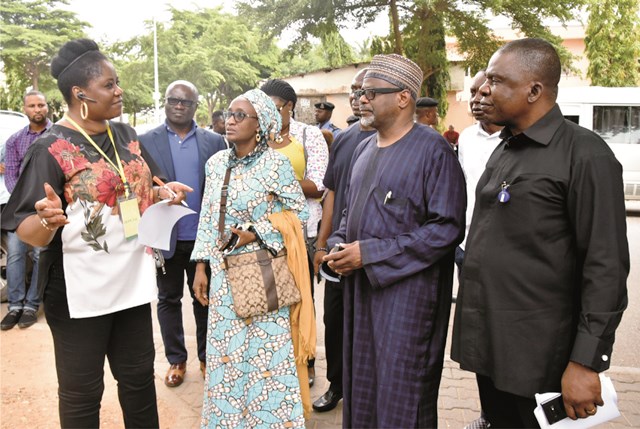Business
Manufacturing Sector’s Output Drops By N78bn – NBS

The manufacturing sector recorded a decline of about N77.92bn in output in the first quarter of this year, figures obtained from the National Bureau of Statistics have revealed.
An analysis of the Gross Domestic Product report prepared by the NBS revealed that the sector recorded a total output of N1.69tn as of the end of the fourth quarter of 2017.
However, the level of productivity of the sector dropped by N77.92 billion from the fourth quarter figure of N1.68tn to N1.61tn.
The sector had been badly hit by the harsh operating environment which took its toll on the profit margins of many companies operating in that segment of the economy.
The report said there were 13 sub-sectors that made up the manufacturing sector.
Out of the 13 sub-sectors, only four recorded an increase in economic performance between December and March this year, while nine sub-sectors recorded a decrease in productivity.
The four sub-sectors that recorded increase in economic performance are cement from N145.97 billion in December to N152.41billion; wood and woods products from N51.59bn to N53.21bn; non-metallic products from N59.34bn to N60.43bn; and motor vehicle assembly from N7.14bn to N8.69bn.
The nine sectors that recorded decline in productivity were oil refining from N40.03 billion to N14.67bn; food, beverage and tobacco from N387.98bn to N359.51bn; paper products from N14.13bn to N13.35bn; chemical and pharmaceutical products from N40.34bn to N37.07bn.
The rest are plastic and rubber products from N58.86bn to N58.17bn; electrical and electronics from N1.3bn to N930m; iron and steel from N46.19bn to N40.71bn and other manufacturing from N78.06bn to N72.61bn.
The decline in productivity for the manufacturing sector is not in line with the objectives of government for the sector as contained in the Economic Recovery and Growth Plan.
The government in its ERGP said that it would pursue manufacturing promotion policies that would enable the sector to record an average annual growth rate of 8.48 per cent between 2018 and 2020.
This is expected to rise from -5.8 per cent in 2017 to 10.6 per cent by 2020.
The ERGP was expected to build on the Nigeria Industrial Revolution Plan, to address the key challenges in manufacturing.
Some of these challenges are limited access to credit and financial services, poor infrastructure and unreliable power supply that forces businesses to rely on generators, thus increasing their input costs and reducing their overall competitiveness and profitability.
Speaking on the development, the immediate past Director General, Abuja Chamber of Commerce and Industry, Dr Chijioke Ekechukwu, said that the government needed to step up its diversification agenda with credit policy for manufacturers.
He said while the government had been pursuing the economic diversification since the inception of the current administration, the results had not been too impressive based on recent GDP report released by the NBS.
Apart from agriculture, particularly crop production, he said oil was still the leader in terms of income to Nigeria.
To stimulate the economy, Ekechukwu said there was the need for more reforms to further reduce the cost of doing business and interest rate.
Ekechukwu said, “The country came out of recession as a result of improved production capacity and improved international oil prices.
“These two major reasons are actually out of the control of the government and so achieving that feat cannot be said to be a better plus because if that situation had not happened, it is possible that we won’t have been out of recession.
“In the area of growing the non-oil sector, we have yet to make any significant effort that could take the country to the path of sustainable growth.
Business
Nigeria’s ETF correction deepens as STANBICETF30, VETGRIF30 see 50% decline in a week

Business
BOI Introduces Business Clinic

Business
Dangote signs $400 mln equipment deal with China’s XCMG to speed up refinery expansion

-
Maritime2 days ago
Nigeria To Pilot Regional Fishing Vessels Register In Gulf Of Guinea —Oyetola
-
Maritime2 days ago
Customs Declares War Against Narcotics Baron At Idiroko Border
-

 Sports2 days ago
Sports2 days agoGombe-Gara Rejects Chelle $130,000 monthly salary
-
Maritime2 days ago
NIMASA,NAF Boost Unmanned Aerial Surveillance For Maritime Security
-
Maritime2 days ago
NIWA Collaborates ICPC TO Strengthen Integrity, Revenue
-

 Sports2 days ago
Sports2 days agoTEAM RIVERS SET TO WIN 4×400 ” MORROW” …Wins Triple jump Silver
-

 Sports2 days ago
Sports2 days agoNPFL Drops To 91st In Global League Rankings
-

 Sports2 days ago
Sports2 days agoNPFL Impose Fines On Kwara United Over Fans Misconduct

